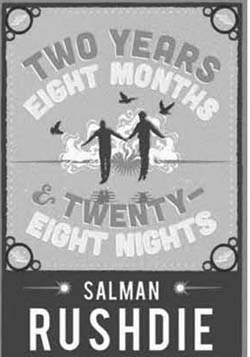Reading one Rushdie novel is like reading another. Good fun. You try to see if you can read it in one sitting because you are not too sure even a book mark would convince you where you left off or whether it was even the same book you were reading. Each book now is a blur and is smokey around the edges and seems to be incestuous and promiscuous, melting weak kneed and sometimes penetrating viciously into other books of his (and his own life) and that of others and also all popular cultural texts that have come anywhere near him. Great virtuoso performances by an always old uncle you want to remember fondly, so when you cringe you do so in sympathy, an uncle whom you always waited for because he was a born story teller, who could keep you hooked on stories which while seeming similar never repeated themselves and, on top of it, referred constantly to life around you, wickedly so to people you knew, so that you were ever alert to catch all his references, and of course since that required so much effort, you fell asleep often and couldn’t have taken it night after night. He was good for a visit, now and then, now more then than now. Can you convince your younger relatives to listen to him (the book cover does try to entice them by calling Rushdie a ‘New York Times Bestselling Author’), perhaps not even though uncle tries very hard to change with the times—after all he refers to everything around him— and perhaps one day soon will meow graphically in order to get new addicts, all he needs is to draw on his artistic talents or his friends. He is mad enough.
Two Years Eight Months and Twenty-Eight Nights is like the children’s novels Rushdie has been writing lately or perhaps all his life, meant for the children in all of us, and serves the world right for behaving so childishly. It has all the ingredients of magic realist fairy tales which are full of sex and violence. Don’t be surprised, when were they not? In any case, you should have the ingredients down pat, since the title of the book should resonate with anyone with even a nodding acquaintance with one of the most famous collection of stories (even if you don’t want to do the arithmetic to find out if the numbers match or not). And add to that our tales from the East speak of the jinns in our world, spirits often released from bottles with heady results. They played their games with us, we played our games with them, but most of all, says Rushdie, they played all the time with each other in a never-ending practical demonstration of positions enumerated in the Kamasutra and many impossible for humans. They had their world and we ours. While these two worlds were separated for many centuries (indeed the foolish among you may think that the worlds never collided again), this novel set in a future utopic world tells us that the earth will see such a time once again, for a period of …, you guessed it, and that this will witness the war between reason and false belief and end in the victory of rationality thanks to a good fairy, I mean jinnia, a princess named Dunia.

